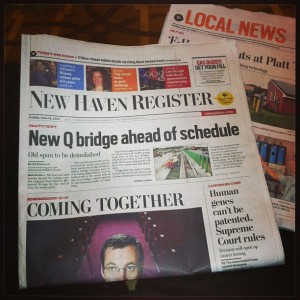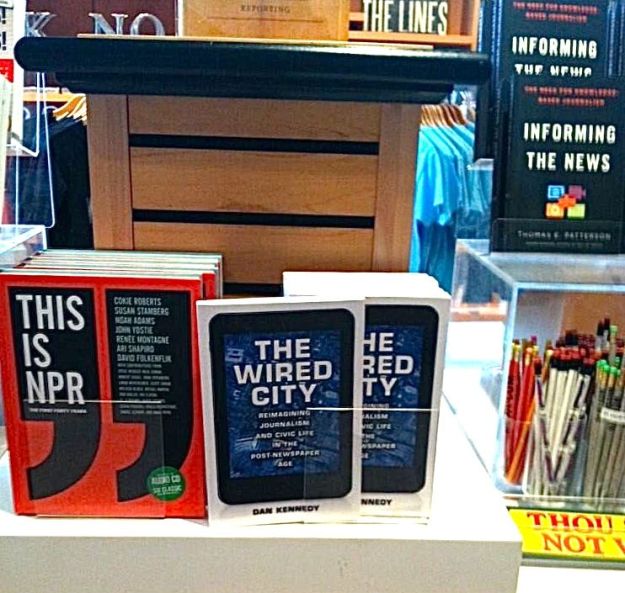This article appears in the Summer 2014 edition of Yes! magazine and is (cc) by Yes! Republished under a Creative Commons license. Some rights reserved.
On a cold night in January, eight people gathered in a harshly lit classroom at Northern Essex Community College in Haverhill, Mass. Over cookies and bottled water, they discussed their latest plans for a project that has been years in the making—a cooperatively owned online news operation to cover their working-class city of 60,000.
The site, set to launch by the end of 2014, will be known as Haverhill Matters. It is the fruition of an idea called the Banyan Project, developed by Tom Stites, a retired journalist whose career included stops at The New York Times and the Chicago Tribune. As with food co-ops, the site will be owned by the members, who will be able to join by contributing money or labor—perhaps by writing a neighborhood blog or covering governmental meetings. If it is successful, Stites hopes to roll out similar news co-ops around the country.
The goal is to serve “news deserts,” a term Stites adopted from “food deserts.” Although Haverhill is covered by a daily and a weekly newspaper, they do not compete: Both are owned by an out-of-state corporate chain that has cut its staff significantly in recent years. The papers no longer have an office in Haverhill. Stites believes that just as a lack of fresh, nutritious food can be harmful to personal health, so, too, can a lack of fresh, relevant news be harmful to civic health.
How would Haverhill Matters make a difference? Mike LaBonte, who co-chairs the planning committee, cites the voluminous coverage given to the 1971 opening of a farmers market by the independent daily that then covered the city. Forty years later, he says, an attempt to revitalize the market received minimal attention.
“There are some aspects of the news that are simply not covered,” LaBonte says. “What I’m hearing from an awful lot of new people is ‘How do I find out what is going on in Haverhill?’”
The Banyan Project may prove to be one way of revitalizing civic engagement through local journalism, but it is far from the only way. Across the country, as traditional news organizations have shrunk, independent online news organizations have sprung up, sparking renewed interest in community not just through news coverage, but also by creating a conversation around that coverage.
Ongoing dialogue with readers
One of the oldest of these online news communities is the New Haven Independent, founded in 2005 by Paul Bass, former star reporter and political columnist for the alternative New Haven Advocate (killed off by its corporate owners). The Independent is staffed by four full-time journalists and is supported through foundation grants, donations from wealthy individuals, sponsorships by large institutions such as colleges and hospitals, and reader contributions.
From the beginning, Bass has carved out a niche that is distinct from the local daily newspaper by fostering an ongoing conversation with his community. Examples range from the ambitious, such as citywide forums on education reform and local politics, to the accidental, such as a mayoral candidacy that played out in the Independent’s comments section in 2007. In that instance, a local real-estate agent announced he was running, only to face a barrage from other commenters after he expressed ignorance of the city’s African American neighborhoods. To his credit, he withdrew shortly thereafter, writing that he realized he had much to learn about his adopted city.
Bass takes comments seriously. Pseudonyms are allowed so as to protect police officers, teachers, parents, and other city stakeholders who would be uncomfortable speaking out under their real names. But every comment is screened by someone on the Independent’s staff before it is posted—or rejected. Bass had to tighten up the rules following an outburst of online sociopathy sparked by an unusually contentious mayoral campaign in 2011. Among other things, would-be commenters now have to register using their real names, though Bass still allows them to post under their pseudonyms. Overall, though, the comments are far more civil and substantive than is the case at most news sites.
Civic engagement at the Independent can also take the form of day-in, day-out news coverage of relatively small quality-of-life issues that larger media can’t be bothered with. For instance, in 2010 the Independent reported on two incidents in which city police confiscated cell phones from bystanders so they couldn’t take video of officers as they made arrests.
The Independent flogged the issue for months. The result: statements from the mayor and the police chief affirming the right of the public to take video of police actions; an internal investigation that found officers had mishandled the two incidents; a mandatory training session at the police academy; and a bill filed at the Connecticut Statehouse making it easier for camera-wielding civilians to sue in response to police harassment. Though the bill did not pass, overall it was an impressive display of how a small news organization rooted in the community could punch above its weight.
“I’ve learned that the public can steer the conversation and take the story to a better place than reporters or editors could ever take it alone,” says Bass.
Four hundred miles west of New Haven, in the small city of Batavia in western New York, Howard Owens is promoting a different kind of civic engagement. Since 2008, his community news site, The Batavian, has been covering Batavia and rural Genesee County—first as part of the GateHouse Media chain, and then independently after Owens’ executive position with the company was eliminated in early 2009. Like Bass, Owens takes online comments seriously; unlike Bass, he requires commenters to use their real names.
Owens has done his share of in-depth coverage at The Batavian, competing with—and sometimes beating—the local daily paper. What keeps his readers engaged, though, is his close attention to more mundane matters: fire alarms, accidents, new park benches being installed, and the like.
“If the siren goes off, people want to know what’s going on,” he explains. “I’ll put something up even if it’s a false alarm. We go out and cover a lot of things that the newspaper tends to overlook as not being important or not worth their time.”
Owens is especially passionate about The Batavian’s relationship with local businesses. As a for-profit, the site depends on advertising, and one of Owens’ beliefs is that “advertising is content.” The Batavian is filled with small ads—nearly 150 of them—from pizza shops, funeral homes, doctor offices, heating companies, tattoo parlors, car dealerships, dog groomers, and the like. Owens does it for the money, of course. But he also is a strong believer in the importance of locally owned enterprises in building a self-sufficient community. As a matter of principle, he refuses to accept ads from Walmart and other national chains.
“We saw declining news readership as both a symptom and potentially a cause of declining civic engagement, thinking that newspapers have sort of lost their focus on their local communities,” says Owens. “We wanted to return that focus by concentrating solely on one community.”
Ordinary Citizens Working with Journalists
The New Haven Independent and The Batavian are proving that both nonprofit and for-profit models can viably foster independent hyperlocal news sites. Both of them, though, depend on professional journalists. In Haverhill, Tom Stites and local activists are hoping to find out whether volunteers can produce worthwhile journalism if they’re provided with a sense of ownership and put to work alongside professionals. The Banyan model calls for two full-time paid employees, an editor and a general manager. The rest of the coverage will come from volunteers, including neighborhood residents and students. It’s a tall order, given how labor-intensive local journalism can be.
Before it can happen, though, the Haverhill Matters planning committee needs to find out if residents will support the project. Committee members figure they need $50,000 in donations from so-called founding members, as well as continuing support in the form of $36 annual fees from at least 1,200 members. At a time when most news sites are free, it’s an ambitious undertaking. The Haverhill Matters launch has been postponed on several occasions. At the January planning meeting, Tom Stites said 2014 has to be the year that it finally gets off the ground.
“We enter 2014 with some momentum. We’ve got to keep it. We’ve got to build it. We’ve been picking away at this thing for a couple of years,” Stites said. “If we don’t do it this year, chances are it won’t get done.”
For those who believe in the importance of local journalism and civic engagement, the experiment unfolding in Haverhill will be important to watch.




